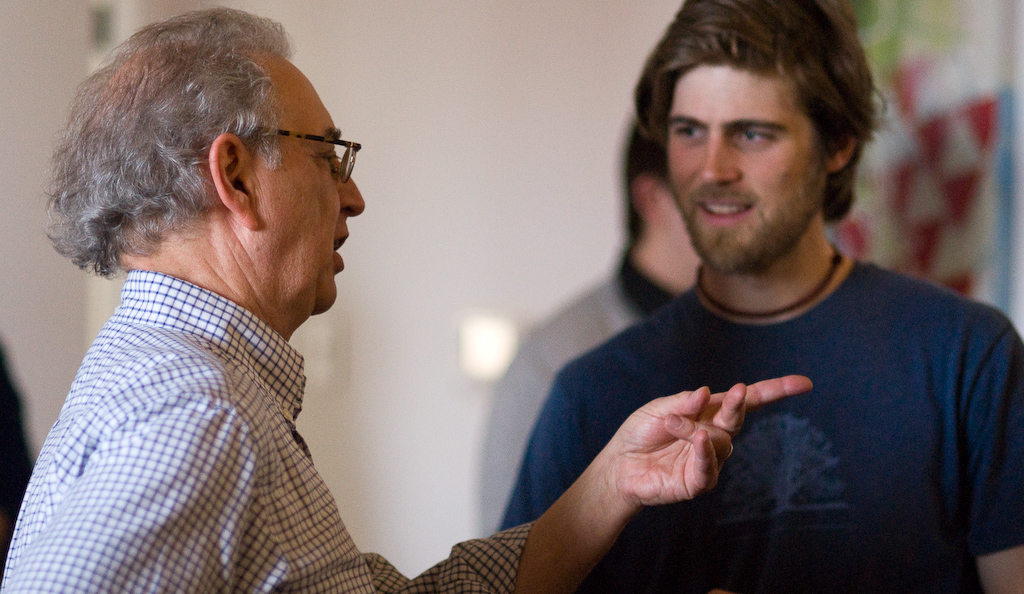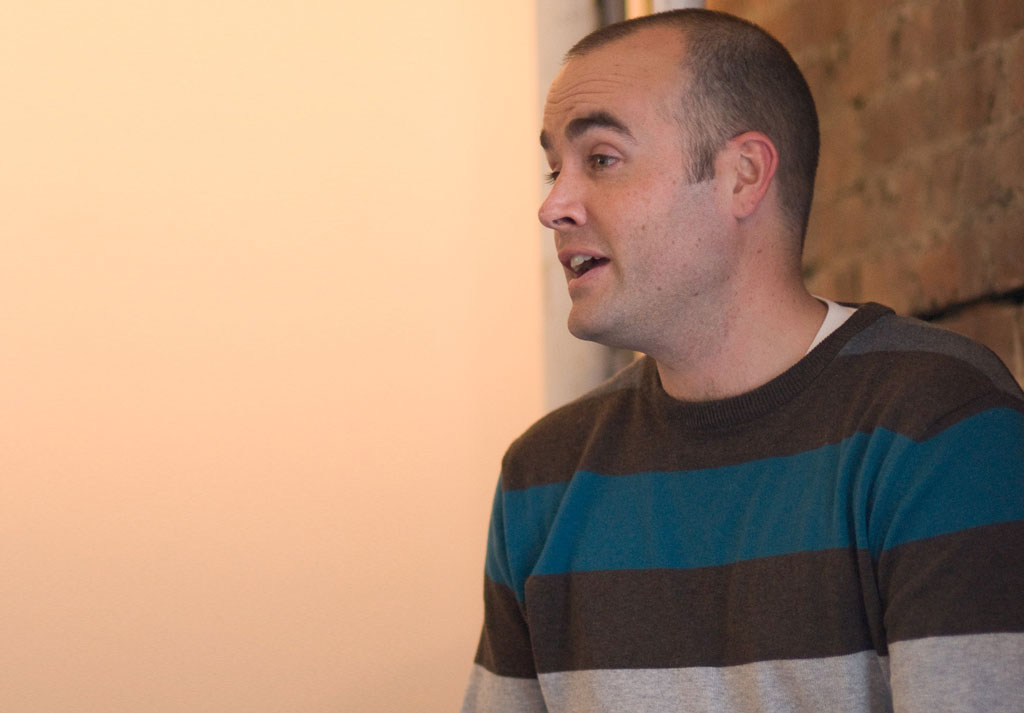Change Through Food Systems

Introduction
Food is something that we often put in our bodies without a second thought. At Change Through, we decided that a dialogue around food systems is something we all need.
'Food Systems' is a term that encapsulates many things: food production, food security, sustainability, and conscious consumption. As urban citizens, how do we engage in food systems? In an age where most people in urban centres don't produce their own food, how do we critically examine our consumption of that which keeps us alive? How do we think about something that is typically viewed as apolitical?
On May 3, 2011, we invited three speakers and one moderator to spark conversation about social change through food systems. They challenged us to think about serious issues surrounding humans' most basic need, and how to carry these issues out into the community.
Speakers

Herb Barbolet — Associate, The Centre for Sustainable Community Development at SFU
Herb Barbolet is an Associate with both the Centre for Sustainable Community Development and the Centre for Dialogue at Simon Fraser University. Herb helped found and works with Local Food First, a consortium of organizations developing a business approach to re-localizing our food supply. He also is a member of the Vancouver Food Policy Council and Vancouver Peak Oil Executive and a Research Associate with the Canadian Centre for Policy Alternatives where he co-authored Every Bite Counts: Climate Justice and BC’s Food System.
Herb spoke about food in relation to politics and later in the event drove home the point about critical thinking in relation to the decisions we make around food. He focused on the need to engage with immigrant farming practices in the Canadian food system.
“We always think immigrants are here to make use of our systems, our styles. Why aren't we asking immigrants for their agricultural practices? Why aren't we learning from them?”

Arzeena Hamir — Agrologist and Coordinator of Richmond Food Security Society
Arzeena Hamir is an agrologist and works as the Coordinator for the Richmond Food Security Society, a non-profit group that advocates for people to have access to nutritious, safe, personally acceptable and culturally appropriate foods, produced in ways that are environmentally sound and socially just. Arzeena worked abroad for many years as a CUSO volunteer in Thailand and as a researcher in Jamaica, India, and Bangladesh. One of her current priorities is to engage the Chinese-Canadian community in Richmond in the food security conversation.
Arzeena talked about the necessity of food education that needs to start at a young age and engage different cultural communities. She also spoke about people who are left out and unengaged in the current food systems conversations, stressing the importance of relocalizing food across all communities.
“Meals are important. It's where the whole family gathers and it's where they usually talk. We need to get food education to the dinner table.”

Mijune Pak — Blogger, FollowMeFoodie.com
Mijune Pak is the creator of the award winning food blog Follow Me Foodie - a restaurant guide detailing culinary adventures locally and abroad, that has now expanded to video blogging and is a trusted online media source for food enthusiasts who have an interest in the culinary scene and enjoy dining out. Mijune is an active proponent of conscious engagement with food especially though facilitating conversation between the producers and consumers.
Mijune talked about the need to gently point out things in our food system that can be changed. She talked a lot about providing spaces for discussion and exploration of ideas instead of preaching or lecturing. Mijune also focused on social media is an open space for having these kinds of discussions.
“I don't get explicit. I hint, and if people want to ask me, I'll tell them why I don't eat shark’s fin, or why I think it's wrong to buy this or that. But I won't start that discussion until I'm asked.”
Moderator

Anthony Nicalo — Chef and entrepreneur, Foodtree.com
Anthony Nicalo has spent his career as a chef and entrepreneur dedicated to the notion that story should be a key ingredient in everything we consume: the story of what, the story of where, the story of when, the story of how, and the story of why. His passion for food systems has been demonstrated through Inevitable Table, Farmstead Wines, nonprofit Farmfed, and most recently Foodtree, a global, participatory database of local food.
Anthony, our moderator, stressed that we should keep in mind that everyone in the room was very optimistic about the topic, but also somewhat pessimistic on the larger scale of the food systems issue. He reminded us to always keep in mind the support of the choir when attempting to make a difference to others.
“Food is the one thing that we can all create social change through because it is a commonality. It is the one thing we all share.”
Audio
Following is the full audio from the speaking half of the event:
Conversations

“The conversation then turned to the language of food. It is a loaded topic; morality and judgment are inherent in it. [..] A change in policy goes along with a change in our perception of the subject, and language is a big part of that.”
“Dealing w/ cultural mores. Approaching the Chinese community via youth activists due to language barrier.”
“All in all, this was a great event that brought together a diverse audience from many professions, backgrounds and interests.”
Wrap

After a lengthy discussion, several people are already looking at actions to follow up on tonight's learnings. One attendee decided to use social media as a tool to remind people to think about food as something other than nourishment. Two other attendees plan on connecting to engage others in developing a food systems policy for Canada. Most people in the room agreed to think about the language they use around discussing food thanks to a comment from Joyce Rock, Executive Director of the Downtown Eastside Neighbourhood House, who discussed "food sovereignty" and food as a basic human right. Arzeena has connected with an attendee for an opportunity to promote the Richmond Food Security's May conference.
What will you do about food systems now?

